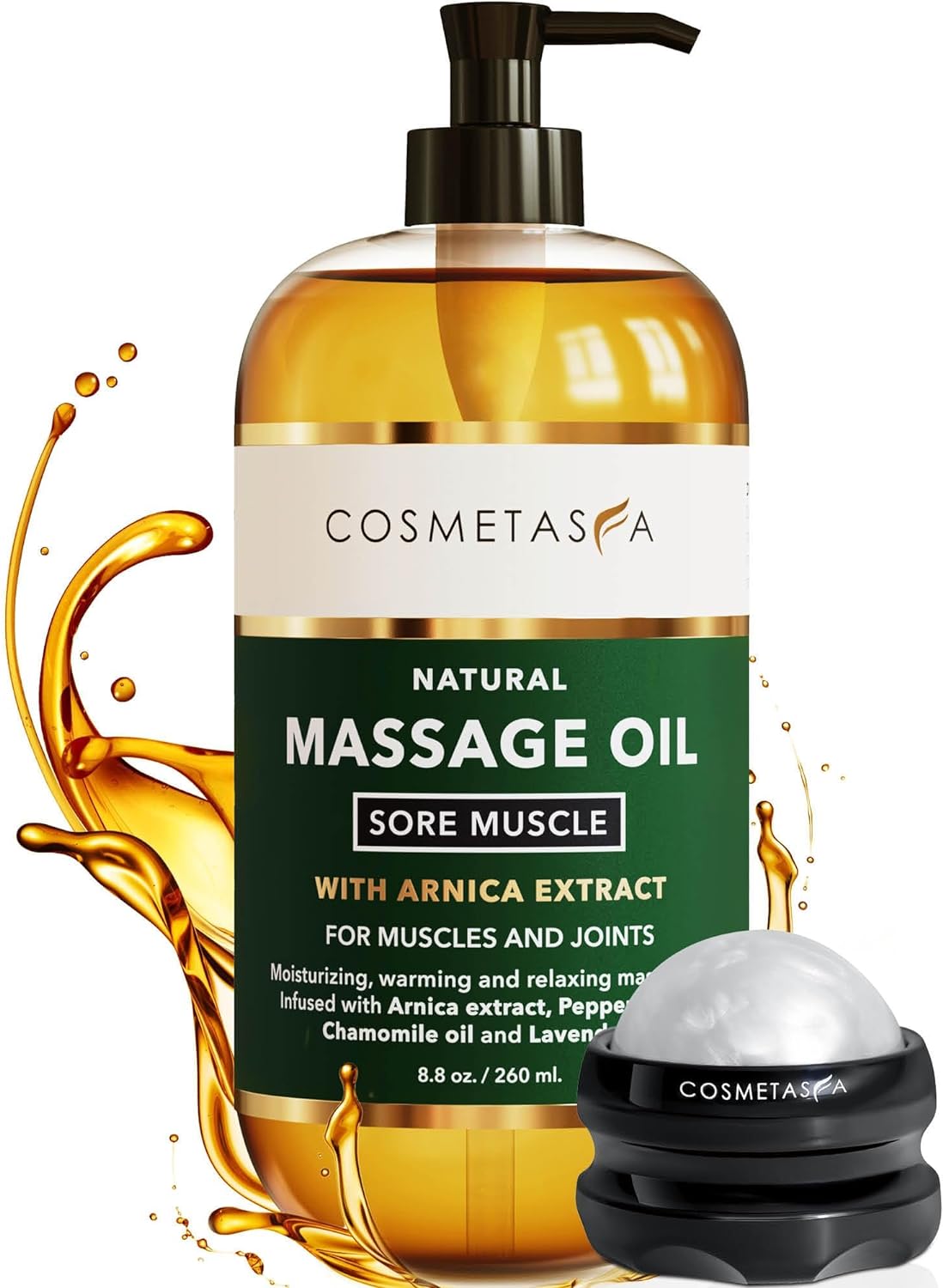
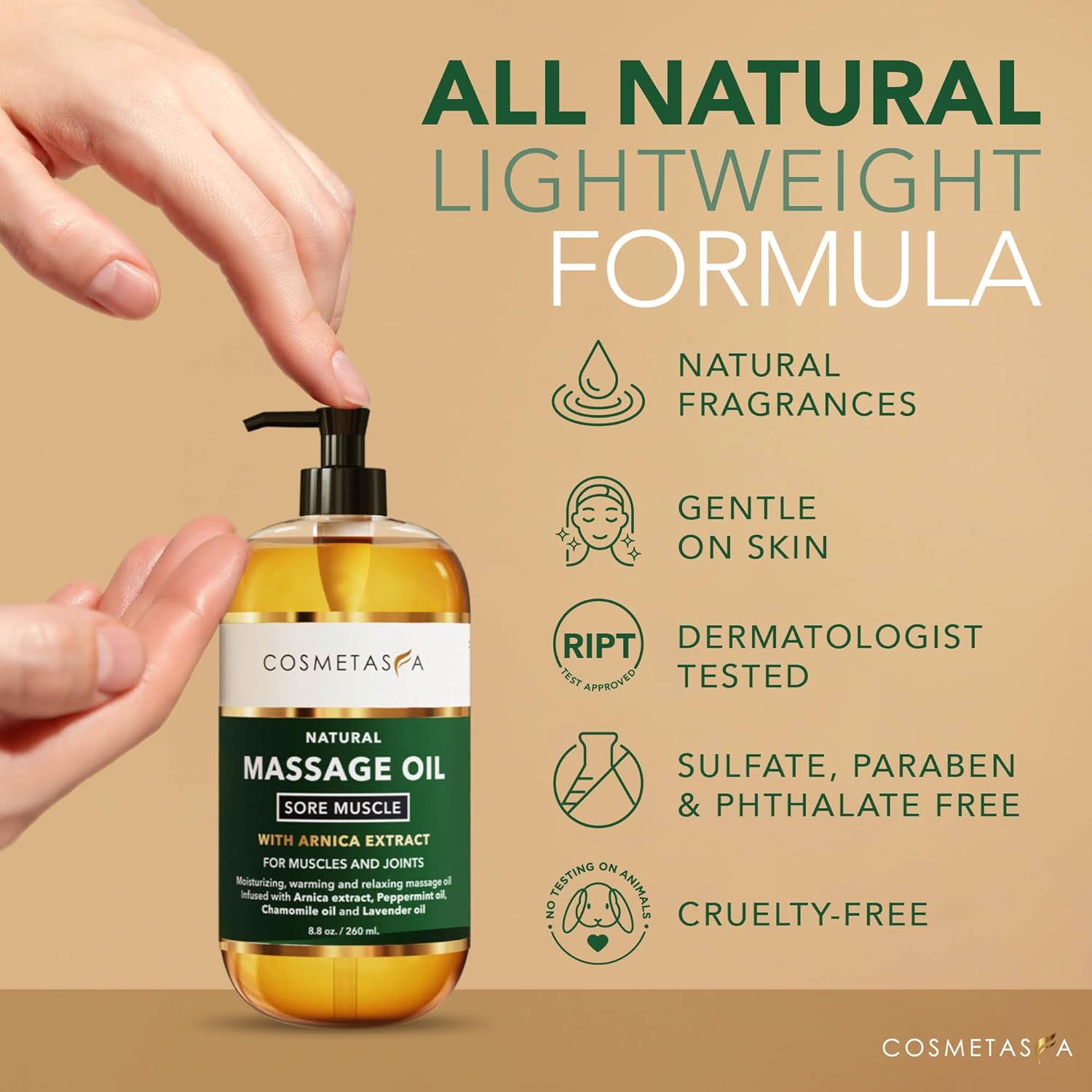

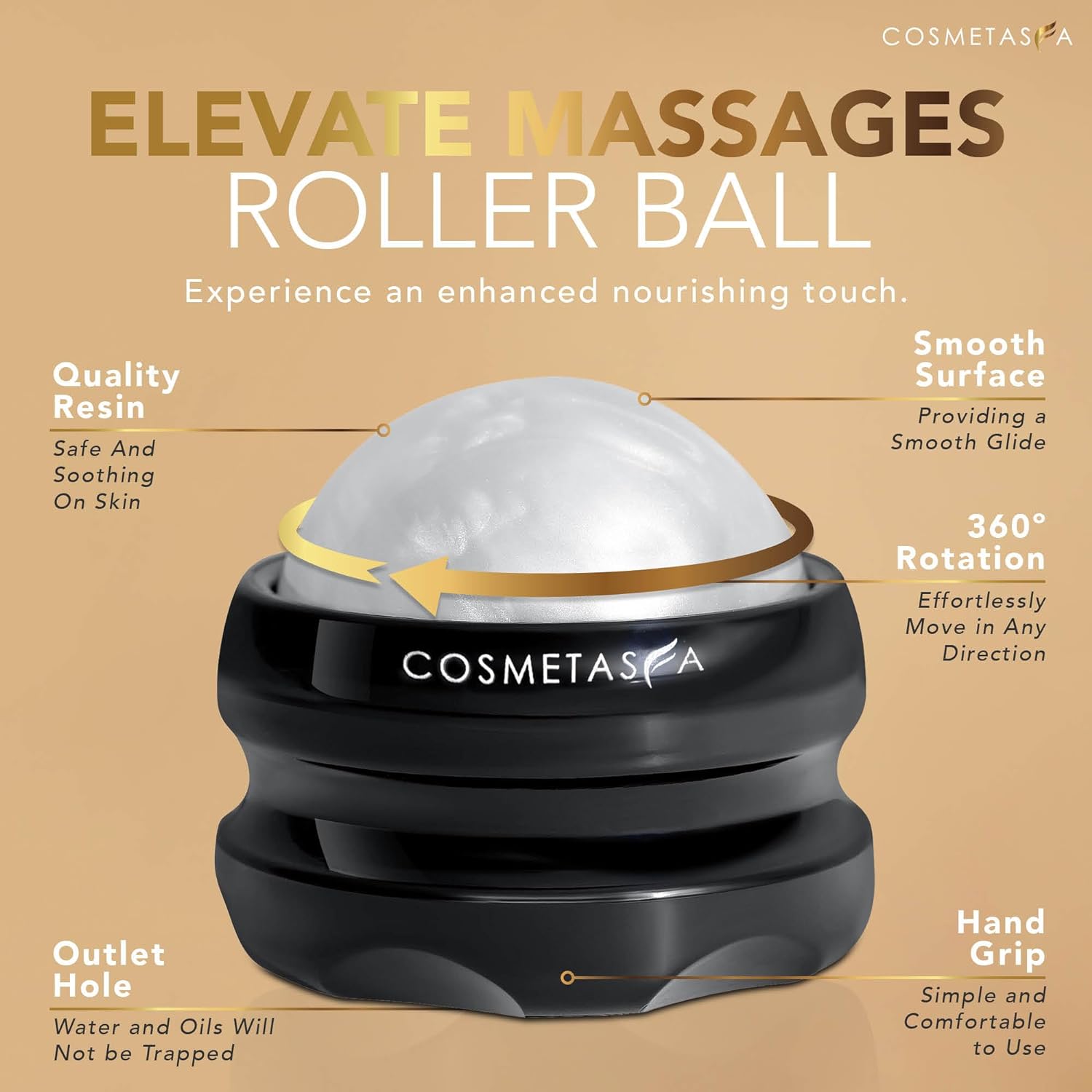
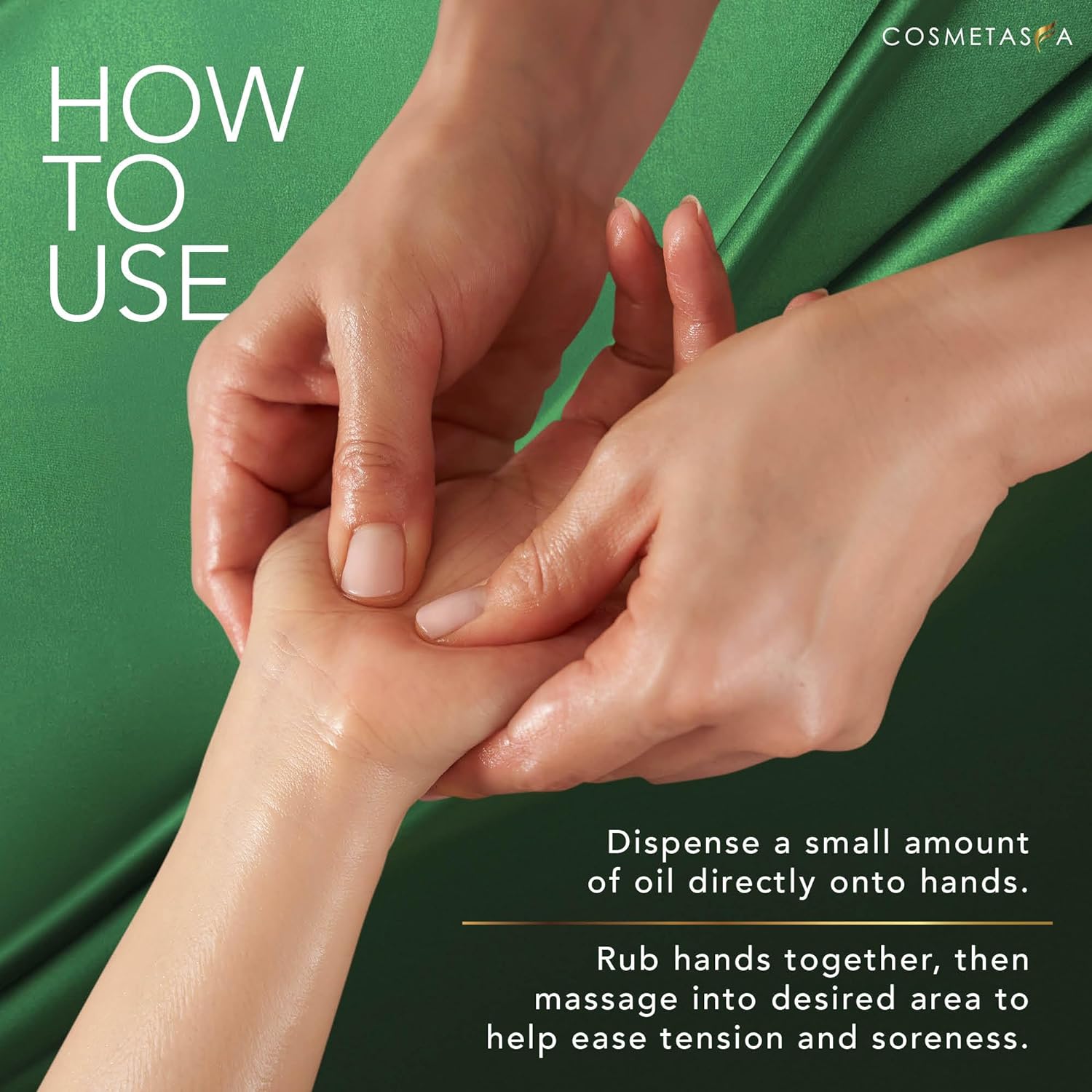
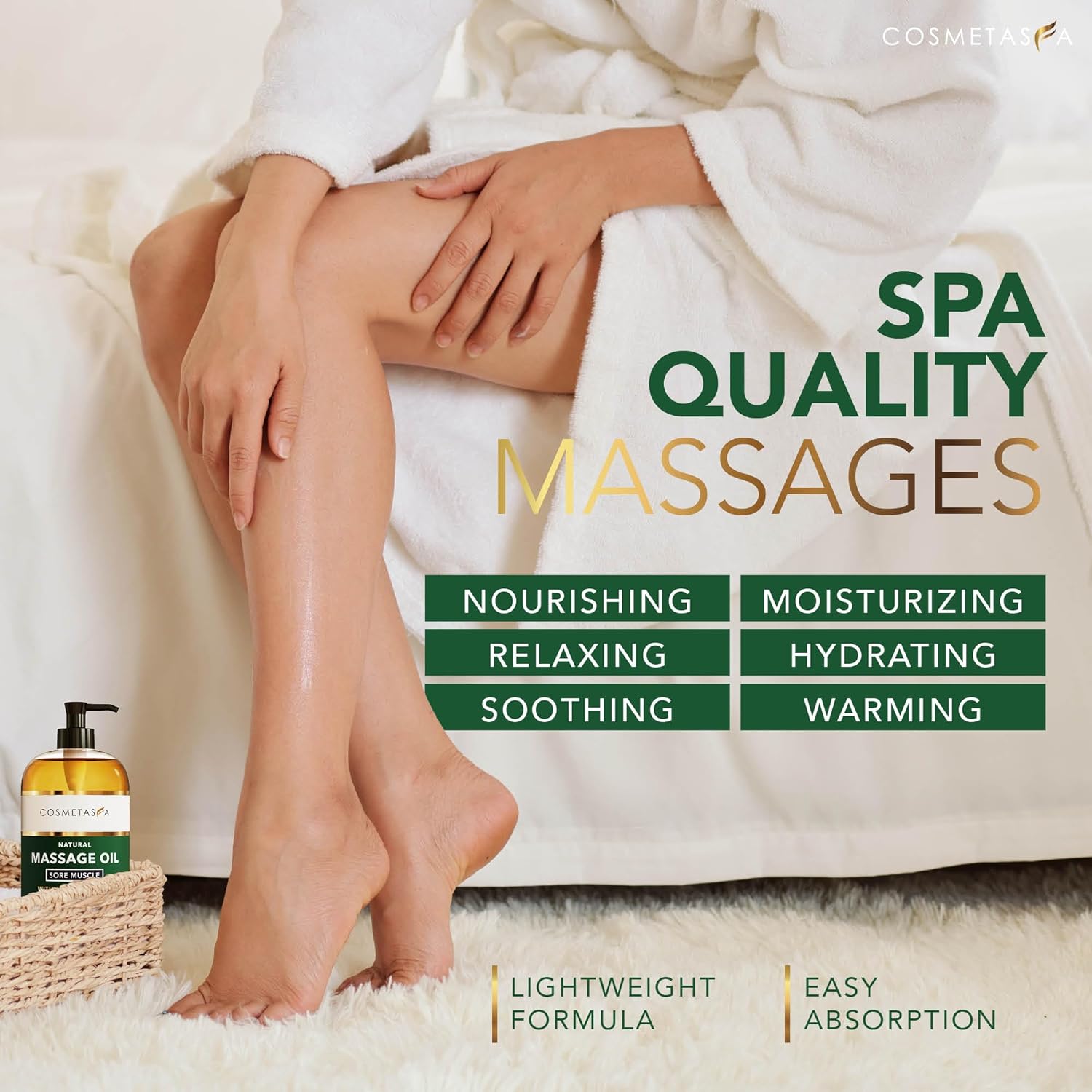
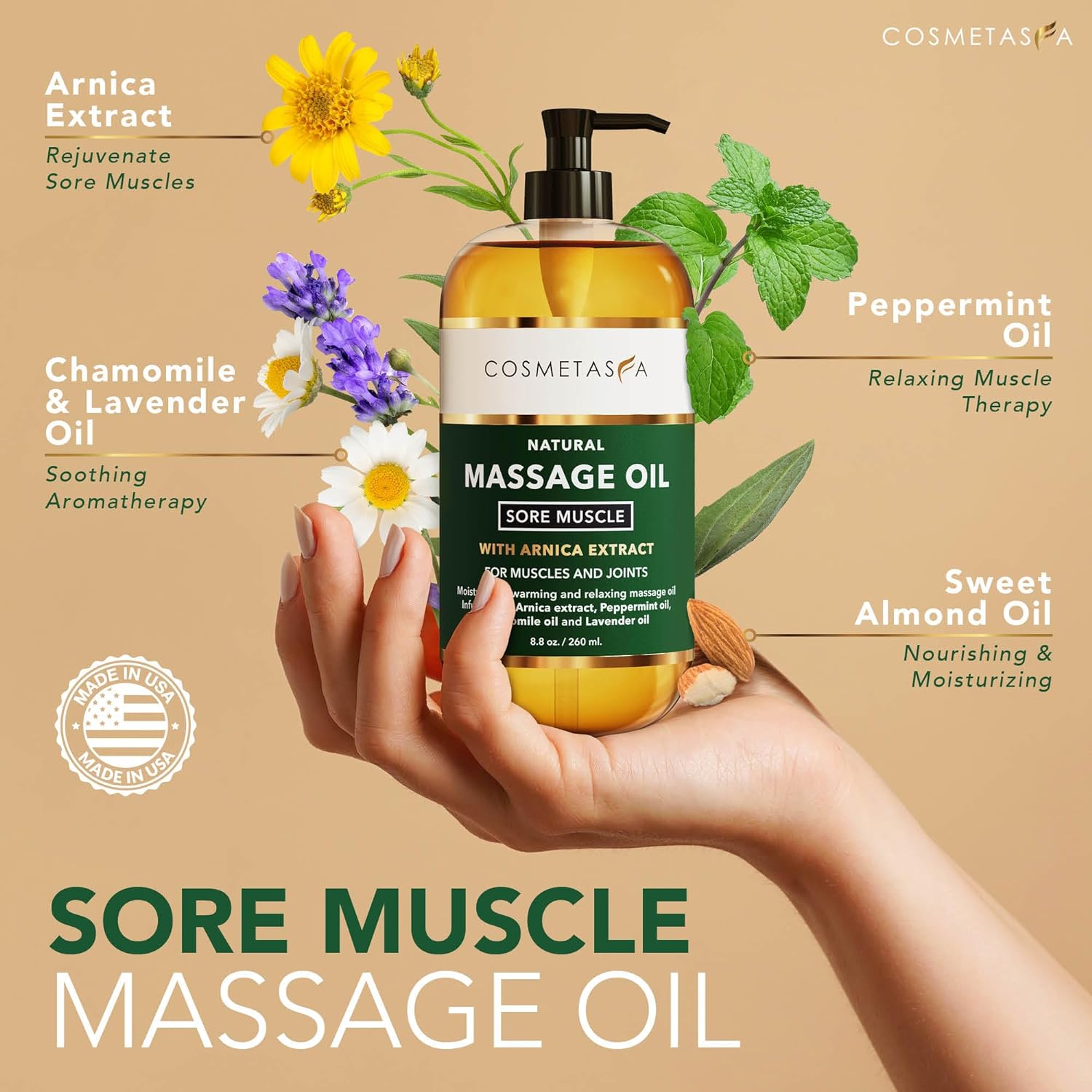

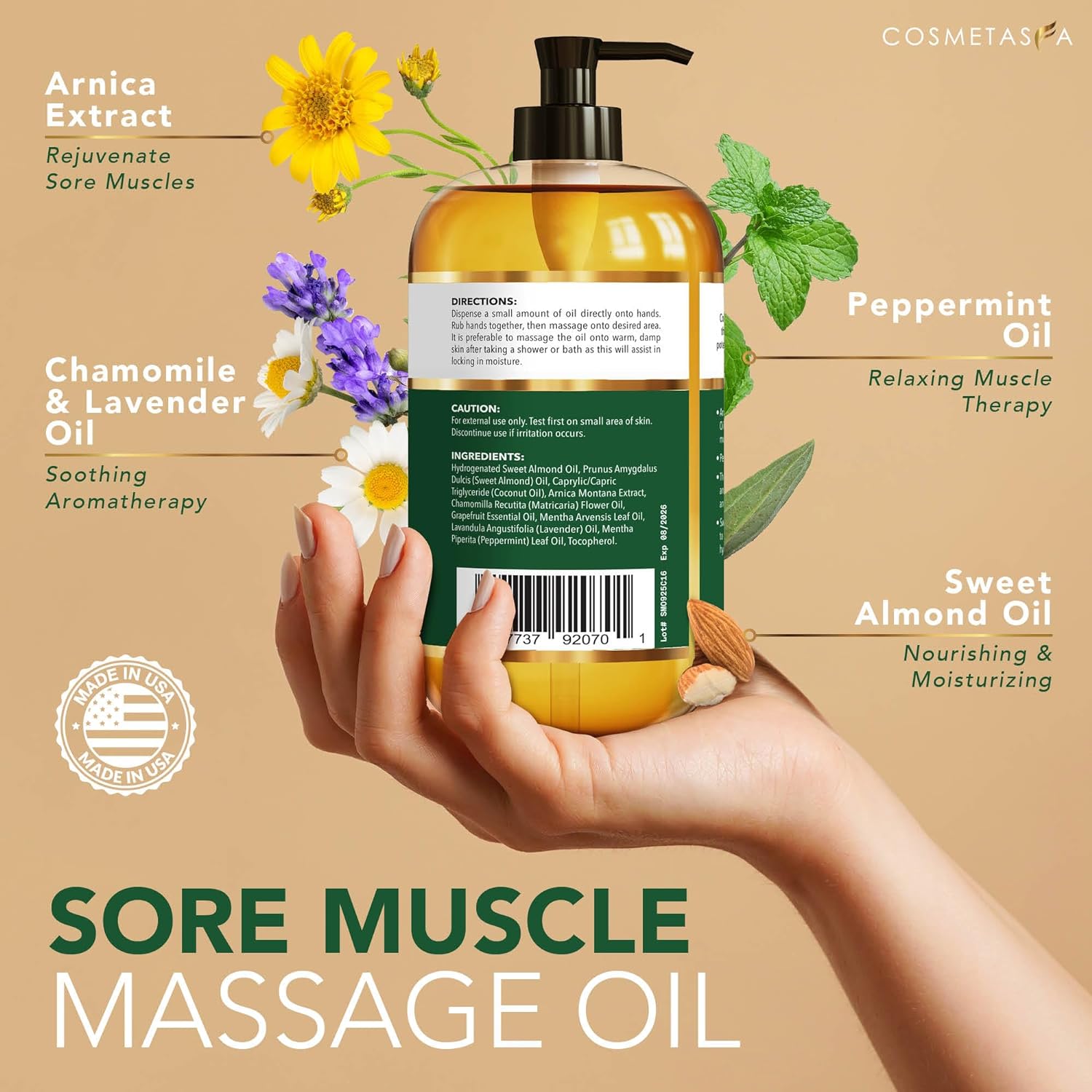
Cosmetasa Massage Oil - Eases Sore Muscles with Arnica & Lavender, Lightweight Formula - 3.4oz


Arnica Montana (Arnica) Flower Extract
Medium RiskArnica montana flower extract is derived from the dried flowers of the arnica plant, commonly used in topical formulations for its anti-inflammatory and analgesic properties. It is often included in products aimed at alleviating pain and bruising.
Sustai Insights
Arnica montana flower extract offers functional benefits as a natural anti-inflammatory and pain relief agent, with sustainable sourcing possibilities. However, it poses moderate allergenic risks and can cause skin irritation in sensitive individuals. Regulatory bodies, including the FDA, do not currently restrict its use, indicating a low overall risk for carcinogenicity and reproductive toxicity. Safe usage practices should be followed to minimize adverse effects, and alternatives such as calendula extract may be considered for similar benefits. Overall, the risk level associated with arnica montana extract is assessed as medium.
Cocos Nucifera (Coconut)
Medium RiskCocos Nucifera, commonly known as coconut, is derived from the coconut palm. It is widely used in various cosmetic and personal care products for its moisturizing properties, acting as an emollient and skin-conditioning agent, enhancing texture and hydration.
Sustai Insights
Cocos Nucifera offers functional benefits such as effective moisturization and conditioning for the skin, while being biodegradable and often sustainably sourced. Health risks are minimal, with low concerns for carcinogenicity, allergies, and reproductive toxicity. Environmental risks are also low, as it does not accumulate in organisms or significantly pollute. Regulatory bodies do not impose restrictions, supporting its overall low-risk status. Safe usage practices include patch testing for sensitivities, though alternatives like shea butter or jojoba oil may offer similar benefits.
Citrus Paradisi (Grapefruit) Oil
Medium RiskCitrus paradisi (grapefruit) oil is an essential oil derived from the peel of grapefruit. It is commonly used in personal care products for its fragrance and potential antibacterial properties. It is also utilized in aromatherapy and cosmetic formulations for its refreshing scent.
Sustai Insights
Citrus paradisi oil offers functional benefits such as fragrance enhancement and potential antimicrobial properties. However, it presents a high allergenic potential, which may cause skin irritation or allergic reactions in sensitive individuals. Environmental concerns include its persistence and bioaccumulation. Regulatory advisories exist that restrict its use in certain products, leading to an overall moderate risk assessment. Safe usage practices should be followed to minimize health risks, and alternatives such as essential oils with lower allergenic profiles could be considered.
Caprylic Triglyceride
Low RiskCaprylic triglyceride is an ester derived from coconut oil and glycerin, commonly used in cosmetic formulations as an emollient, stabilizer, and skin-conditioning agent. It helps to improve the texture and spreadability of products while providing a lightweight, non-greasy feel.
Sustai Insights
Caprylic triglyceride offers functional benefits such as enhanced skin moisturization and improved formulation stability. It is generally regarded as safe, with low concerns regarding carcinogenicity, allergenic potential, and reproductive toxicity. Environmental impact is minimal, with no significant pollutant or bioaccumulative properties identified. Regulatory bodies have not issued warnings or restrictions. Overall, the risk level is low, making it a suitable ingredient in cosmetic products. Safe usage practices include adhering to recommended concentrations, and while there are alternatives, caprylic triglyceride remains a reliable choice.
Tocopherol, D Alpha
Low RiskTocopherol, specifically d-alpha tocopherol, is a naturally occurring form of Vitamin E. It is commonly used in cosmetic and personal care products primarily for its antioxidant properties, helping to protect formulations from oxidation and extend shelf life.
Sustai Insights
D-alpha tocopherol provides effective antioxidant benefits, contributing to product stability. It is sustainably sourced and generally regarded as safe, with low concerns regarding carcinogenicity, allergies, and reproductive toxicity. However, there are minor concerns about endocrine disruption. Regulatory bodies have not imposed significant restrictions, indicating low overall risk. Recommended usage practices include adhering to established safe concentration thresholds. Alternatives, such as other forms of Vitamin E or plant-based antioxidants, may also be considered.
Corylus (Hazelnut) Oil
Low RiskCorylus (hazelnut) oil is derived from the nuts of the hazel tree. It is primarily used in cosmetic and skincare products for its emollient properties, providing moisture and enhancing skin texture. The oil is rich in fatty acids and vitamins, contributing to its function as a skin conditioning agent.
Sustai Insights
Corylus (hazelnut) oil offers functional benefits as a moisturizer and skin conditioner while being biodegradable and potentially sustainably sourced. Health risks are low, with minimal concerns related to carcinogenicity, allergenic potential, or reproductive toxicity. Environmental impacts are also low, with no known bioaccumulation issues. Regulatory status shows no restrictions. Overall, the ingredient is assessed as low risk, with safe usage practices recommended and no significant alternatives noted.
Lavandula Angustifolia (Lavender) Flower Oil
Low RiskLavandula angustifolia (lavender) flower oil is an essential oil derived from the flowers of the lavender plant. It is commonly used in personal care products for its aromatic properties and is known for its potential soothing effects in formulations.
Sustai Insights
Lavender oil provides functional benefits such as fragrance enhancement and potential calming effects, contributing to user experience in various personal care products. It is sustainably sourced and has low toxicity levels. Health risks associated with lavender oil are minimal, with low concerns for carcinogenicity, allergies, and reproductive toxicity. Environmental risks are also low, with no significant pollutant concerns. Regulatory assessments indicate no current restrictions, affirming its safety for use. Overall, the ingredient is considered low risk, making it a favorable choice in formulations.
Mentha Piperita (Peppermint) Oil Extract
Low RiskMentha piperita (peppermint) oil extract is derived from the peppermint plant and is commonly used in various products for its aromatic and flavoring properties. It serves multiple functions, including acting as a fragrance agent and providing a cooling sensation in topical applications.
Sustai Insights
Mentha piperita oil offers functional benefits such as flavor enhancement and a refreshing aroma, while it is generally recognized as low risk for health concerns, including carcinogenicity and allergies. Environmentally, it does not contribute significantly to pollution or bioaccumulation. Regulatory bodies do not impose restrictions on its use. Safe usage practices include avoiding excessive exposure, particularly for sensitive individuals. Alternatives like spearmint oil may be considered, but overall, this ingredient is assessed as low risk.
Hydrogenated Sweet Almond Oil
Low RiskHydrogenated sweet almond oil is an end-product derived from sweet almond oil through hydrogenation, which alters its chemical structure to enhance stability and shelf life. It is commonly used in cosmetic formulations for its emollient properties, helping to soften and soothe the skin.
Sustai Insights
Hydrogenated sweet almond oil offers functional benefits as a moisturizer and skin conditioning agent, with low concerns regarding carcinogenicity, allergies, or reproductive toxicity. Environmentally, it poses minimal risks as it is not considered a pollutant or bioaccumulative. Regulatory bodies have not issued significant restrictions. Overall, the ingredient is assessed to have low risk, making it a suitable option in cosmetic formulations. Alternatives include natural oils like jojoba or argan oil for similar moisturizing effects.
Caprylic Triglyceride
Low RiskCaprylic triglyceride is an ester derived from coconut oil and glycerin, commonly used in cosmetic formulations as an emollient, stabilizer, and skin-conditioning agent. It helps to improve the texture and spreadability of products while providing a lightweight, non-greasy feel.
Sustai Insights
Caprylic triglyceride offers functional benefits such as enhanced skin moisturization and improved formulation stability. It is generally regarded as safe, with low concerns regarding carcinogenicity, allergenic potential, and reproductive toxicity. Environmental impact is minimal, with no significant pollutant or bioaccumulative properties identified. Regulatory bodies have not issued warnings or restrictions. Overall, the risk level is low, making it a suitable ingredient in cosmetic products. Safe usage practices include adhering to recommended concentrations, and while there are alternatives, caprylic triglyceride remains a reliable choice.
Arnica Montana (Arnica) Flower Extract
Medium RiskArnica montana flower extract is derived from the dried flowers of the arnica plant, commonly used in topical formulations for its anti-inflammatory and analgesic properties. It is often included in products aimed at alleviating pain and bruising.
Sustai Insights
Arnica montana flower extract offers functional benefits as a natural anti-inflammatory and pain relief agent, with sustainable sourcing possibilities. However, it poses moderate allergenic risks and can cause skin irritation in sensitive individuals. Regulatory bodies, including the FDA, do not currently restrict its use, indicating a low overall risk for carcinogenicity and reproductive toxicity. Safe usage practices should be followed to minimize adverse effects, and alternatives such as calendula extract may be considered for similar benefits. Overall, the risk level associated with arnica montana extract is assessed as medium.
Tocopherol, D Alpha
Low RiskTocopherol, specifically d-alpha tocopherol, is a naturally occurring form of Vitamin E. It is commonly used in cosmetic and personal care products primarily for its antioxidant properties, helping to protect formulations from oxidation and extend shelf life.
Sustai Insights
D-alpha tocopherol provides effective antioxidant benefits, contributing to product stability. It is sustainably sourced and generally regarded as safe, with low concerns regarding carcinogenicity, allergies, and reproductive toxicity. However, there are minor concerns about endocrine disruption. Regulatory bodies have not imposed significant restrictions, indicating low overall risk. Recommended usage practices include adhering to established safe concentration thresholds. Alternatives, such as other forms of Vitamin E or plant-based antioxidants, may also be considered.
Cocos Nucifera (Coconut)
Medium RiskCocos Nucifera, commonly known as coconut, is derived from the coconut palm. It is widely used in various cosmetic and personal care products for its moisturizing properties, acting as an emollient and skin-conditioning agent, enhancing texture and hydration.
Sustai Insights
Cocos Nucifera offers functional benefits such as effective moisturization and conditioning for the skin, while being biodegradable and often sustainably sourced. Health risks are minimal, with low concerns for carcinogenicity, allergies, and reproductive toxicity. Environmental risks are also low, as it does not accumulate in organisms or significantly pollute. Regulatory bodies do not impose restrictions, supporting its overall low-risk status. Safe usage practices include patch testing for sensitivities, though alternatives like shea butter or jojoba oil may offer similar benefits.
Corylus (Hazelnut) Oil
Low RiskCorylus (hazelnut) oil is derived from the nuts of the hazel tree. It is primarily used in cosmetic and skincare products for its emollient properties, providing moisture and enhancing skin texture. The oil is rich in fatty acids and vitamins, contributing to its function as a skin conditioning agent.
Sustai Insights
Corylus (hazelnut) oil offers functional benefits as a moisturizer and skin conditioner while being biodegradable and potentially sustainably sourced. Health risks are low, with minimal concerns related to carcinogenicity, allergenic potential, or reproductive toxicity. Environmental impacts are also low, with no known bioaccumulation issues. Regulatory status shows no restrictions. Overall, the ingredient is assessed as low risk, with safe usage practices recommended and no significant alternatives noted.
Citrus Paradisi (Grapefruit) Oil
Medium RiskCitrus paradisi (grapefruit) oil is an essential oil derived from the peel of grapefruit. It is commonly used in personal care products for its fragrance and potential antibacterial properties. It is also utilized in aromatherapy and cosmetic formulations for its refreshing scent.
Sustai Insights
Citrus paradisi oil offers functional benefits such as fragrance enhancement and potential antimicrobial properties. However, it presents a high allergenic potential, which may cause skin irritation or allergic reactions in sensitive individuals. Environmental concerns include its persistence and bioaccumulation. Regulatory advisories exist that restrict its use in certain products, leading to an overall moderate risk assessment. Safe usage practices should be followed to minimize health risks, and alternatives such as essential oils with lower allergenic profiles could be considered.
Lavandula Angustifolia (Lavender) Flower Oil
Low RiskLavandula angustifolia (lavender) flower oil is an essential oil derived from the flowers of the lavender plant. It is commonly used in personal care products for its aromatic properties and is known for its potential soothing effects in formulations.
Sustai Insights
Lavender oil provides functional benefits such as fragrance enhancement and potential calming effects, contributing to user experience in various personal care products. It is sustainably sourced and has low toxicity levels. Health risks associated with lavender oil are minimal, with low concerns for carcinogenicity, allergies, and reproductive toxicity. Environmental risks are also low, with no significant pollutant concerns. Regulatory assessments indicate no current restrictions, affirming its safety for use. Overall, the ingredient is considered low risk, making it a favorable choice in formulations.
Mentha Piperita (Peppermint) Oil Extract
Low RiskMentha piperita (peppermint) oil extract is derived from the peppermint plant and is commonly used in various products for its aromatic and flavoring properties. It serves multiple functions, including acting as a fragrance agent and providing a cooling sensation in topical applications.
Sustai Insights
Mentha piperita oil offers functional benefits such as flavor enhancement and a refreshing aroma, while it is generally recognized as low risk for health concerns, including carcinogenicity and allergies. Environmentally, it does not contribute significantly to pollution or bioaccumulation. Regulatory bodies do not impose restrictions on its use. Safe usage practices include avoiding excessive exposure, particularly for sensitive individuals. Alternatives like spearmint oil may be considered, but overall, this ingredient is assessed as low risk.
Hydrogenated Sweet Almond Oil
Low RiskHydrogenated sweet almond oil is an end-product derived from sweet almond oil through hydrogenation, which alters its chemical structure to enhance stability and shelf life. It is commonly used in cosmetic formulations for its emollient properties, helping to soften and soothe the skin.
Sustai Insights
Hydrogenated sweet almond oil offers functional benefits as a moisturizer and skin conditioning agent, with low concerns regarding carcinogenicity, allergies, or reproductive toxicity. Environmentally, it poses minimal risks as it is not considered a pollutant or bioaccumulative. Regulatory bodies have not issued significant restrictions. Overall, the ingredient is assessed to have low risk, making it a suitable option in cosmetic formulations. Alternatives include natural oils like jojoba or argan oil for similar moisturizing effects.
Discover the soothing power of Cosmetasa Massage Oil for Sore Muscles, expertly crafted in the USA. This warming massage oil is designed to relieve soreness and promote relaxation, making it an essential addition to your wellness routine.
- Soothing Relief: The unique blend of arnica, lavender, and peppermint oils provides targeted relief for sore muscles, helping to ease tension and promote recovery.
- User-Friendly Design: Featuring a 360-degree spinning massage ball, this oil glides smoothly on the skin, allowing effortless application without straining your hands.
- All-Natural Ingredients: Infused with sweet almond oil and chamomile extract, this cruelty-free formula is free from parabens and sulfates, ensuring a safe and nourishing experience.
- Lightweight & Non-Greasy: Enjoy a luxurious feel with fast absorption, leaving your skin silky smooth and lightly scented without any greasy residue.
- Perfect Gift Choice: Ideal for anniversaries or spa lovers, this massage oil makes a thoughtful gift that enhances relaxation at home or in professional settings.
Subscribe & Save with Sustai
- Best Price Guarantee: Always enjoy the lowest prices on sustainable home essentials.
- No Surprises: We’ll notify you before shipping. No hidden fees, ever.
- You’re in Charge: Change, pause, or cancel your subscription anytime with ease.
- Eco-Friendly Deliveries: Our grouped shipments mean less packaging and lower emissions.
Join us on a sustainable journey. Special offers for a limited time! Prices and promotions may change.
Recommended Products
Discover the soothing power of Cosmetasa Massage Oil for Sore Muscles, expertly crafted in the USA. This warming massage oil is designed to relieve soreness and promote relaxation, making it an essential addition to your wellness routine.
- Soothing Relief: The unique blend of arnica, lavender, and peppermint oils provides targeted relief for sore muscles, helping to ease tension and promote recovery.
- User-Friendly Design: Featuring a 360-degree spinning massage ball, this oil glides smoothly on the skin, allowing effortless application without straining your hands.
- All-Natural Ingredients: Infused with sweet almond oil and chamomile extract, this cruelty-free formula is free from parabens and sulfates, ensuring a safe and nourishing experience.
- Lightweight & Non-Greasy: Enjoy a luxurious feel with fast absorption, leaving your skin silky smooth and lightly scented without any greasy residue.
- Perfect Gift Choice: Ideal for anniversaries or spa lovers, this massage oil makes a thoughtful gift that enhances relaxation at home or in professional settings.

You can have at most 2 Sustainable Steals products in your cart
Customer Reviews
Customers’ View
Customers express high satisfaction with the Massage Oil for its effectiveness in relieving sore muscles and promoting relaxation. Many users highlight the pleasant warming sensation it provides during massages, with one reviewer noting that it effectively eases tension without becoming overly hot. The oil's lightweight, non-greasy texture and quick absorption are frequently praised, ensuring a smooth application without sticky residue. Additionally, the pleasant scent, primarily of lavender and peppermint, adds to the overall experience, enhancing relaxation. However, some customers noted the importance of being aware of its almond content due to allergy concerns. Overall, this product is well-received for its natural ingredients and user-friendly application, aligning with the values of health-conscious consumers.
AI-generated from the text of customer reviewsThis product is rated 4.3 of 5.0 stars.
It has received 121 reviews.




